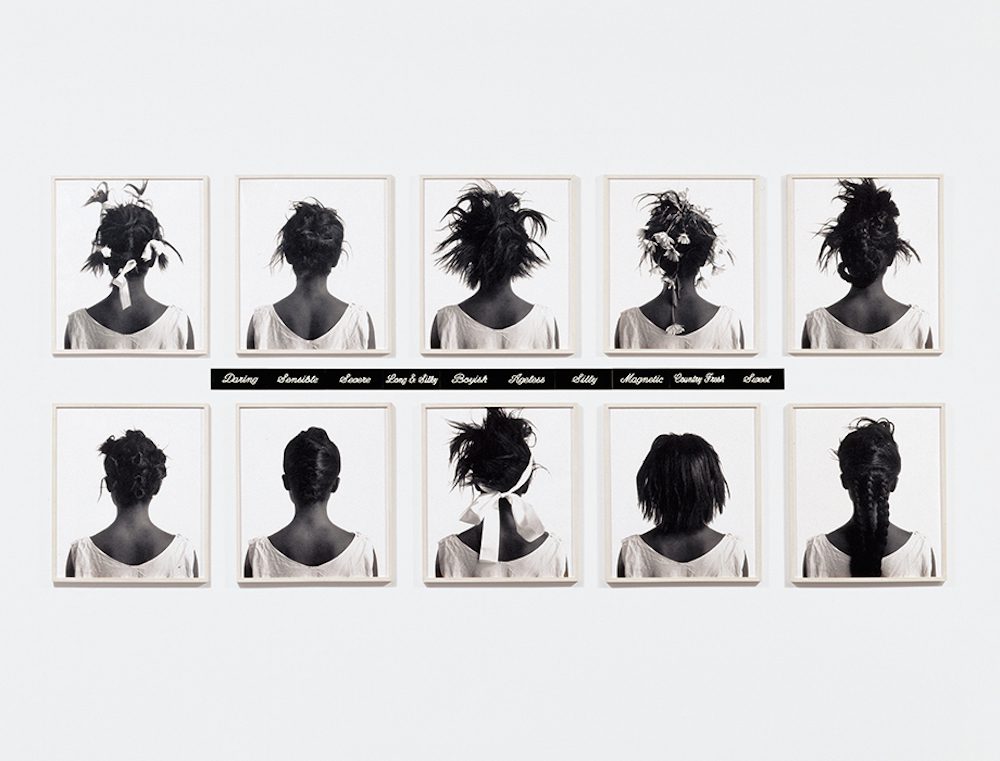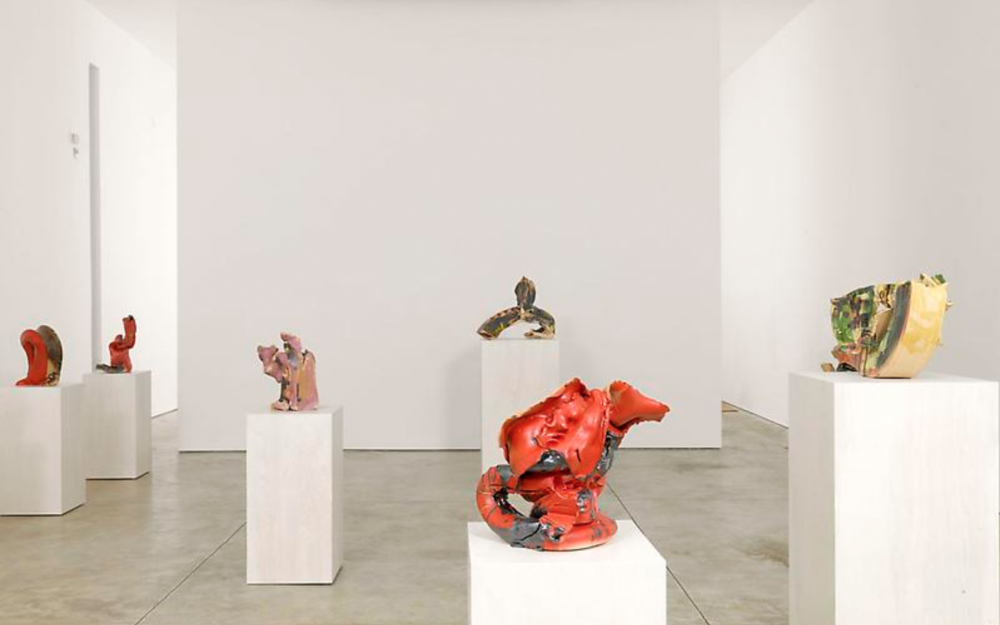Just Relax
Co-founder of Arts.Black, Jessica Lynne, contributes a heartfelt interview with her mother about intergenerational hair choices.

Lorna Simpson, Stereo Styles, 1988. Set of 10 black-and-white dye-diffusion polaroid prints and 10 engraved plastic plaques. Courtesy Lsimpsonstudio.com.
Editor's Note
In this informal interview, Jessica Lynne talks black hair with her mother, Naomi Fudge, using a short story written by Lynne as a point of reference. Published in the inaugural issue of Blackberry Magazine in 2012, “Relaxed,” follows a day in the life of Lottie, a young girl hoping her mom will allow her to get a relaxer for a school dance. Excerpts from the story, which appear in italics, frame the conversation.
Most Saturday afternoons, I sit by myself on the bus home from the docks. I smell of fish and bait and dirt and although I’m sure no one is ever repulsed by my scent, I’m also sure they’d much rather find a seat elsewhere. Can’t say I blame them. I keep telling Daddy that he should hire an extra shrimper. I want to spend my Saturday afternoons gossiping with Ellen. Daddy could enjoy the company of someone to whom the stench of the Bayou belongs. Of course, Daddy never listens. The Bayou, he’d say, was not just any place. You can’t have just anyone workin’ down here. This is holy land, Lottie.
Jessica Lynne: What was your initial reaction to the short story? Since you’ve read the story before, was your response different this second time around?
Naomi Fudge: The first time I read the story I thought, “Oh, that’s cute. It’s a nice little story.” This second time around I would say that it was different. I agreed with Lottie’s mom for saying no to the relaxer now that I know what I know about hair and hair care products and their effects. I was hoping that Lottie could see her mother’s point of view.
JL: Is it safe to assume you related the most to Lottie’s mom?
NF: Yes, I relate to the mom because I had children who wanted to get perms at an early age. I did not have the opportunity to get a perm as a young girl—not because they weren’t available but because my parents weren’t going to pay for them.
JL: I don’t actually know much about your childhood hair stories. When was the first time you got a relaxer?
NF: Of course you know I have very coarse hair. I wore braids most of the time, through elementary school and junior high, braids and pigtails. I could wear a real big ’fro and I even remember one time my mother combing enough hair out of my head that I had a ’fro for my doll. (laughs) When I got to high school, I wanted my hair straightened. I thought, “ When I go to prom, I’m going to get relaxer.” I’m using relaxer and perm interchangeably, however, a perm is what a white woman might get to curl her hair, and you note that in the story. Relaxers are what we get to straighten our hair.
JL: We being black women?
NF: Yes.
JL: Was grandma still doing your hair as a senior in high school?
NF: No, she wasn’t. I mean the pigtails were elementary school. In high school, I started doing my own hair but having really thick, coarse hair made it difficult to style my hair. I’ve never been one to keep up with the styles, but I did want an easier way to maintain my hair.
JL: So you got your first relaxer in 1983, your senior year in high school?
NF: About ’82, ’83.
All I want to do is straighten my hair. Everything else about me is changing anyway. A few days ago, I found my first stretch mark, beige and zig-zaggy, on my right butt cheek. I called Ellen to boast, as I’ve heard stretch marks are a sign of womanhood. I’m not afraid to change. This is what I will tell my mother tonight at dinner. I stare at my hair in the mirror, angry at the frizzy ponytail.
JL: You said that, in the story, you identified with the mom. It sounds like you can also identify with Lottie. In this story Lottie is about 15 or 16 years old. She’s trying to go to a dance and wants to get her hair relaxed. Her intention sounds similar to yours when you were in high school.
NF: Yes, that’s true. I got the relaxer to fit in with the crowd, to have what I thought, at the time, was a nicer style of hair. Straight hair was the “in” thing. It was also a maintenance issue for me. Because my hair is so thick and because I was an athlete, a relaxer simply cut down the time it would take for me to do my hair myself. I guess I can relate to both characters, but Lottie pressing her mother to get that relaxer, see, that wasn’t me. She wanted to go to the dance and wanted to have a nice hairstyle, but she was pressing her mom too hard.
JL: Do you think I pressed you?
NF: You were a bit of a nuisance, yes. (laughs)
JL: That’s only because I was working through my relationship to my hair. How would you describe your relationship to your hair?
NF: I like my hair. My hair and its texture can hold any style that I want. I like it because it’s strong. It’s healthy and I can, with the aid of a hair stylist, wear any style I want.
JL: I have distinct memories of family members making comments at gatherings about my hair. They would say, “Oh, Naomi, ain’t you gonna get that girl’s hair done?” or “Jessica, why don’t you tell your mom to get you a relaxer?” As a kid, those comments stung. As an adult, I recognize that those comments were coming from a certain place, not necessarily hatred or spite, but it does surprise me that folks felt comfortable saying those things to a little girl. How would you feel when people made those remarks? Why do you think those comments were even made in the first place?
NF: Everyone thought long, flowy hair was “good hair” because of what we saw on TV and in Hollywood. You didn’t see many women on television wearing their natural hair. The only people I remember wearing naturals were actresses from the ’70s—Florida and Thelma from Good Times. What most of us saw on our TV screens were black women wearing relaxed hair so, of course, those comments about your hair would be made.
JL: I think your decision to not allow your daughters to get relaxers as young girls is quite political. Do you?
NF: I don’t think it was political, Jessica.
JL: I’m not of the mindset that natural hair is better than relaxed hair or vice versa. That’s such a point of contention it seems for black women. The problem is that we’re often taught that one is better than the other. At the end of the day, how you wear your hair is a very personal decision. For me, that’s what makes black hair so cool, so fun, so magical. We have so many options, natural or not.
NF: Right. Right. For me, I just was not going to pay for you to get a relaxer as a little girl. They are expensive and I knew, as an adult and having had my hair relaxed, that it does and can and will change your hair. I’ve always been a proponent of having as few chemicals as you can within your body and within your system. In the back of my mind, I knew this was one less chemical that you all had to deal with at an early age. And your hair was so pretty anyway, you didn’t need it.
JL: Were you disappointed when I made the decision to get a relaxer my senior year of high school?
NF: The decision to get a relaxer doesn’t necessarily mean that you don’t like the state of your hair. Again, it wasn’t that deep for me. So no, I wasn’t.
I want to remind her that bald is better than naps. Cynthia McKee, the yearbook editor, shaved all of her hair off last summer and by the end of the first day of school she had three dates to the Harvest Festival. My naps are just ordinary: dark brown bush resting atop my head, slight tint of copper. Besides, Cynthia McKee isn’t really that pretty. She shaved her hair to make a statement. In gym class this week, Brian Shaw told me he thought I was cute. If I straighten my hair I can be a pretty girl making a statement.
JL: Let’s go back to the story. There is one section where Lottie is pondering what a new hairstyle might mean for her. She’s genuinely excited about the intangible effects of this relaxer on her expression of womanhood. It’s like a rite of passage for her. I know I saw it as such when I was her age. Do you think your first relaxer affected how you saw yourself in the world?
NF: As a teenager walking into prom, I do recall carrying myself a little differently, although it really shouldn’t have made such a difference in my attitude.
JL: I don’t know any other group of women who have to negotiate that: “I can’t wear my hair the way it grows out of my head because people might think x, y, z about me.”
NF: I’ll tell you this: when I started interviewing for my current job, I relaxed my hair and stopped wearing my twists. It’s not that I was ashamed of my hair, but I knew how other people viewed it. Once I got the position, I let the relaxer grow out. It wasn’t that I couldn’t accept who I was. I just knew that in certain spaces others wouldn’t accept me in my natural state. You almost have to play a game.
JL: Who are these other people that you refer to?
NF: The other people in this instance were the white people I had to interview with.
JL: I hear you, I do, but someone has to walk into an interview with their natural hair for the game to end, right? I feel as if I’m living in an era where black women are making less and less apologies about how they look, hair and all. It feels good. I want to make sure I understand you though. What’s the game you’re talking about?
NF: Because of certain preconceived notions about image, one might have to alter something about oneself in order to get ahead.
JL: I don’t have the energy nor am I interested in this game, Ma. You keep saying it’s not that deep, but these negotiations seem heavy to me.
NF: So, maybe it is political like you mentioned earlier. There are several women that I work with now who are rocking locs, or twists, or other natural styles, who at the time of applying for their jobs had relaxed hair because it’s deemed more professional. The relaxer didn’t change who I was or who I thought I was, but I knew that I had to play the game.
JL: What do you think this game you refer to says about wider attitudes towards black women’s hair and beauty? If there is a game we have to play, I think that is rather indicative of feelings about what type of appearance is okay for black women in certain spaces and what isn’t okay.
NF: To me natural hair is perceived as unkempt. It may not be verbalized all the time but I believe people think that.
JL: Do you think that is a fair judgment?
NF: Oh no, absolutely not. I should be judged on my actions not my appearance.
JL: How are you feeling about relaxed hair now? Using your example, if you were to apply for another job, would you relax your hair again?
NF: I would not. I like wearing my hair natural. At this point, if I decided I needed straight hair, I’d buy a wig or something. (laughs) Now, I’m of the mindset that if I were to apply for a new position I would want whoever would be hiring me to know what they would be getting, hair and all.
JL: That’s interesting because in the story Lottie watches her mom come to a similar realization. Her mom usually picks Lottie up on Fridays and they go to the hair salon but there is one day when Lottie doesn’t get picked up after school. She comes home to find her mom lying down on the couch, the relaxer cut out of her hair. Even the words you used to describe your decision mirrors, for me, Lottie’s mom’s decision.
When I was little my mother got a relaxer every six weeks, Friday at 2:30pm. She entered the salon laughing with her hairdresser about something I was too young to understand. She sat in the black leather chair and I would watch as the relaxer was mixed then delicately lathered over her entire head. Are you burning the hairdresser would ask. My mother responded yes or no depending on the day. During these visits, I was expected to read or write but all I could concentrate on was my mother. Two and a half hours later she would emerge from the dryer with hair that blew in the wind. These were our moments. I would ask about boys and cooties. Soon, boys will be the only on your mind, she would say.
JL: Can we stay with the story a bit longer?
NF Sure. Sure.
JL: One of things I was reminded of while reading the story is how special black hair salons are no matter what you get done to your hair while you are there. I would argue that salons occupy an important place in the hearts of many black women. Your stylist becomes another friend. Depending on how often you go and your relationship to the people there, the salon is often an extension of home and family. That’s one of the things I enjoy most about the salons. I knew I was safe. I knew someone would ask about my family. I knew I could go get that five-dollar, fried fish meal. (laughs) How important are salons to you?
NF: I’ve made very good connections with everyone who has done my hair. So many women: Mrs. Pequoia, Mrs. Josephine, Mrs. Bulah on Jefferson Avenue. The beauty salon is such a significant and important part of my life. These were women of wisdom who offered so much advice to me and they became like family. You’re right.
JL: So, Ma, how are you wearing your hair tomorrow?
NF: I don’t know. Maybe two-strand twists?



